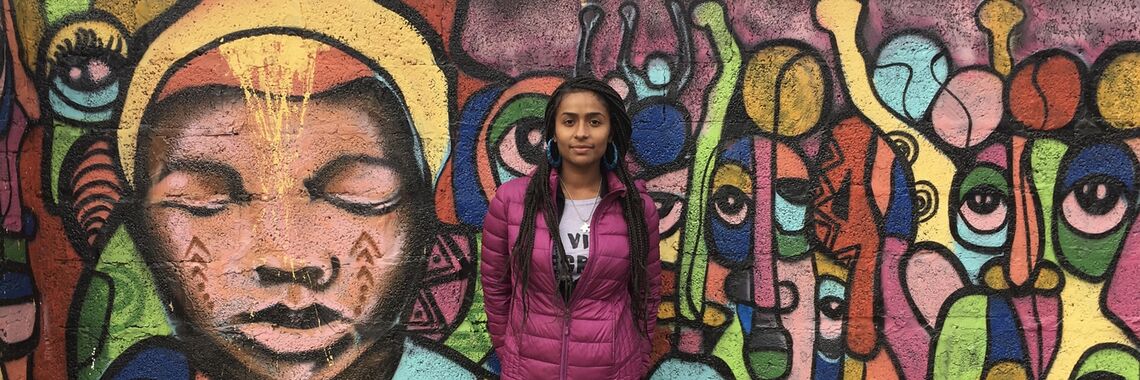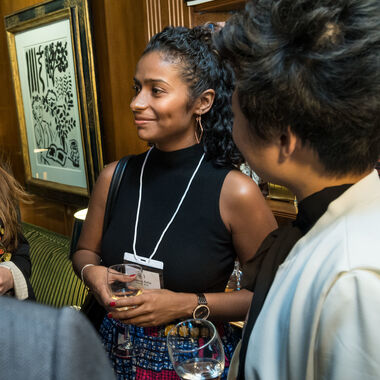P.D. Soros Fellowship for New Americans
If you are an applicant and need to sign into the online application, you can find the link on the "Apply" page of our website: Apply Page.
If you are a fellow looking to login, please note that we are currently updating our backend system for managing Fellow data. In the meantime, to update your information for the Fellowship, please send updates to Nikka Landau at nlandau@pdsoros.org.
Q&A: Educator and Scholar Julissa Muñiz Looks Back At The Fellowship
2018 Paul & Daisy Soros Fellow Julissa Muñiz is a PhD candidate in human development and social policy at Northwestern University where she studies teaching and learning in the carceral context, specifically as understood and experienced by incarcerated youth. In addition to the Paul and Daisy Soros Fellowship, Julissa has received funding for her doctoral studies and dissertation research from the University of Texas Austin Division of Diversity and Community Engagement, the Social Science Research Council/Northwestern University, the Buffett Institute, the Northwestern Program of African Studies and the National Academy of Education/ Spencer Foundation.
Julissa was born in San Diego to Mexican immigrant parents, she lived in Tijuana, Mexico the latter half of her childhood, commuting to and from school in San Ysidro, California. At the age of 16, Julissa gave birth to her creative and brilliant daughter, Amaris. Julissa was the first teenage mother to return to her high school and two years later, she became the first student at her high school to ever be accepted to the University of California, Berkeley. In 2015, Julissa attended the Harvard’s Graduate School of Education where she earned her Ed.M. Upon graduating, she was nominated and selected as her cohort’s Intellectual Contribution Award recipient.
Why did you apply to The Paul & Daisy Soros Fellowships for New Americans?
I first heard about the Paul and Daisy Soros Fellowships for New Americans in the first year of my doctorate program. Naturally I wanted to learn more about the Fellowship, so I did some additional research and started reading through some of the student profiles. Every single person I read about seemed absolutely incredible and extremely accomplished, which of course psyched me out. Although I started the application, I couldn't bring myself to submit it, in part because I doubted myself. The following year, I revisited the PD Soros website and once again read through the student profiles, but this time rather than focusing on the schools they attended and their accolades I focused on their stories. In doing so, I saw their strength, tenacity, intelligence, humility, and their commitment to improving the world we live in. That moment gave me the confidence to apply. I too shared those characteristics and desire, so why not apply? That day I made a commitment to myself and weeks later I submitted my application.
You’re now finishing up the second year of the Paul & Daisy Soros Fellowship program. Has the Fellowship been what you expected?
Overall, the PD Soros Fellowship exceeded my expectations. Since day one the staff have been incredibly welcoming in a familial way. You can tell that they've really sat with each of our applications and have taken the time to get to know us and our needs. While the financial support has been incredibly helpful over the last two years, the community that followed was the most unexpected part. The staff do an incredible job of creating opportunities for us to connect and build as a cohort. They also do a great job of inviting alumni to connect with current Fellows so over the last two years I've had numerous opportunities to meet other PD Soros Fellows from previous years. Although I'm sad that our two years are over, I trust that PD Soros will continue to find opportunities for us to stay involved as alumni.
Do you have any favorite memories from the past two years as a Paul & Daisy Soros Fellow?
One of my favorite memories from the past two years of the PD Soros Fellowship took place during our second Fall Conference. It was our last night in the city and a group of maybe ten of us, perhaps more, found a karaoke bar in the neighborhood. Without much hesitation we all put on our coats and made the trek to the karaoke bar. For hours we sang at the top of our lungs, we sang a little bit of everything from Backstreet Boys to Usher to Blink 182 to Whitney Houston. We had a great time! It's moments like that, that I will forever cherish (now more than ever).
What advice would you give to someone who is thinking of applying to The Paul & Daisy Soros Fellowships for New Americans?
My advice for PD Soros applicants is simple, you have a 100% chance of not getting it if you don't apply. Apply! Let them tell you 'no.' Even if you're not awarded the Fellowship, the practice of going through the process of applying will likely strengthen your application and better prepare you for the next fellowship or grant. I say shoot high and see what happens, don't discount yourself from the race. Also, if you have any questions feel free to reach out to us, many of us are happy to talk to you and answer any questions you may have.
How do you plan to stay active with the Fellowship community in the years to come?
I am immensely grateful for everything the Paul and Daisy Fellowship has done for me and my peers. Now that I am no longer an active Fellow, my hope is to stay involved through the alumni network. I am also really open to helping prospective applicants so whenever I receive an email from someone interested in applying, I always take the time to answer their questions. As my father-in-law, 8-ball, used to say, "To whom much is given much is expected," as such I will continue to find ways to stay involved and support the growth of the Soros community.
Who has inspired you from the Paul & Daisy Soros Fellowship community?
I have continuously been inspired throughout this process; from the moment I flew to Los Angeles for the interviews to our last Fall Conference. My peers have been a constant source of inspiration. I admire their fierce commitment to justice and improving the lives of others whether through their art, writing, research, practice, or scientific exploration. Many of my peers are selfless and constantly finding ways to give back to their communities whether their creating apps to increase financial literacy (Wendy), voluntarily translating medical resources (Asmaa), or writing op-eds for the broader medical community on why Black Lives Matter (Jamaji), and these are just a few examples. I am inspired knowing that they are not only my friends, but also the future doctors, writers, artists, professors, researchers, scientists, lawyers, and judges of this world. With them sprinkled across the country, and world, I am hopeful we are in good hands.
Where are you with your graduate program now? What’s next?
This fall I start the fifth year of my program. My plan is to graduate in the next year or two depending on COVID-19 and the ensuing job market. For now, I am focusing on finishing data collection before I turn my attention to writing. Recently, I was awarded the National Academy of Education/Spencer Dissertation Fellowship so for the next year I'll be analyzing, writing, and preparing for the academic job market. Additionally, I would like to use this next year as an opportunity to strengthen my teaching and learning practices as an educator, advocate, and soon-to-be professor. Other than that, my focus is on staying healthy, spiritually grounded, and finding ways to support my loved ones and the ongoing fight for social and racial justice.
© 2024

